On a lush cricket ground outside Colombo, the sharp jingling of a ball cuts through the afternoon air. Every rattle is a pushback against the stigma of disability.
Sri Lanka and India are cohosting the first T20 World Cup for visually impaired women.
The semi-finals were yesterday between India and Australia, and Pakistan and Nepal, followed by the final today between India and Nepal.
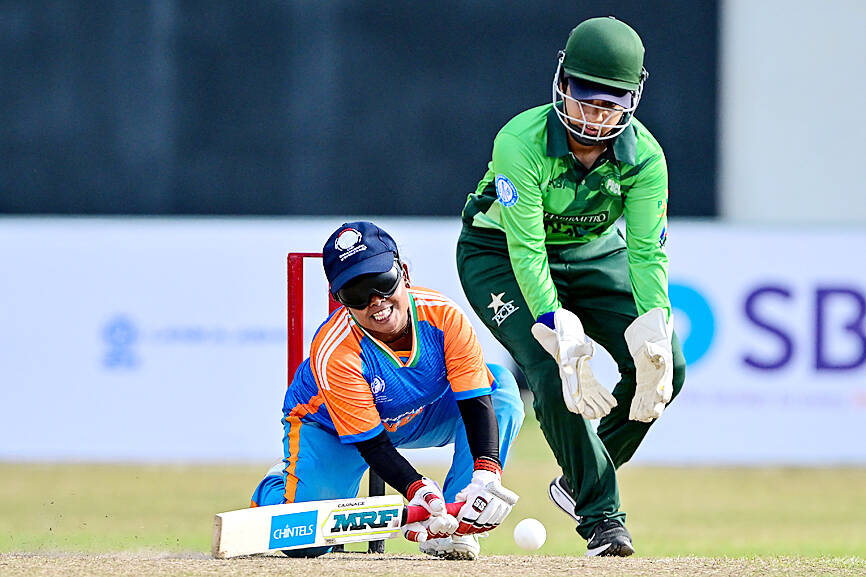
Photo: AFP
India manager Shika Shetty said that the sport has transformed lives and helped change attitudes.
“I think this [World Cup] is one of the biggest opportunities for our visually impaired girls,” said Shetty, who is not blind.
India captain T.C. Deepika recalled the disbelief she faced when she first picked up the bat.
“People were saying: ‘How do they do it? They must be lying,’” she said in a video posted by the Cricket Association for the Blind in India.
“[Later] they realized I can do something. People began to see that I have ability,” Deepika added.
While able-bodied cricket requires players to keep an eye on the ball at all times, blind players must have sharp ears. The white plastic ball, the size of a tennis ball, is packed with ball bearings that rattle as it rolls.
The bowler must ask the striker if he or she is ready and then yell “play” as the jingling ball is delivered underarm with at least one bounce.
Like a regular cricket match, each side has 11 players, but at least four must be totally blind. They are required to wear blindfolds for fairness.
Fielders clap once to reveal their positions.
Others are partially sighted, classified by how far they can see — 2m for B2 players, six for B3. Each team can have up to eight B1, or totally blind, players. Any run scored by a B1 player is counted as two.
Chaminda Karunaratne said cricket has been a refuge and a way to prove that blindness cannot impede his sporting ambitions.
The blind 40-year-old Sri Lankan school teacher has represented his country in international tournaments and wants women to share that space.
“Cricket has done wonders, especially for my mental health,” Karunaratne said as the Indian and Pakistan women’s teams battled it out on the ground.
“When you get into a sport like this it boosts your self-confidence, you can move more freely and you tend to take part in community activities,” he said. “That is liberating.”
“I appeal to parents to send their blind girls to take up cricket. It is an opportunity to interact with others,” added Karunaratne, a key member of the Sri Lanka Cricket Association for the Visually Handicapped. “You can show that you are not helpless, not dependent.”
Association president Sudesh Tharanga said forming a women’s team had been a challenge, although nearly 1 million Sri Lankans are estimated to have some form of visual impediment.
“We started assembling a team only after we were asked in September if we could cohost the T20 tournament in November,” Tharanga said.
Despite limited preparations, Sri Lanka managed to field one of the tournament’s youngest squads.
Additional reporting by staff writer
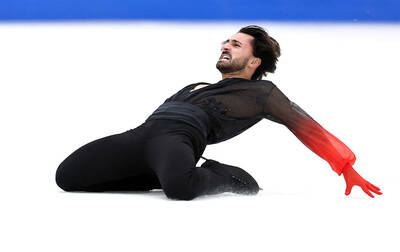
France’s Kevin Aymoz snatched the men’s title at Skate America on Saturday, winning his first grand prix title with a battling free skate, while short program leader Kazuki Tomono faltered. It was an emotional triumph for Aymoz, who made his grand prix level debut in 2017, with seven prior podium finishes, but no gold. He had struggled with a painful foot injury since a disappointing 10th-place finish at Skate Canada last month. “It was so difficult,” the 28-year-old said. “After Skate Canada I wanted to give up so much and today I’m here and it’s so beautiful to be with my friends competing
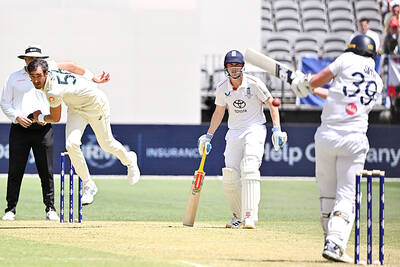
Nineteen wickets fell yesterday on an opening day of carnage in the first Ashes Test, with England’s attack led by skipper Ben Stokes bowling them into a position of strength after Australia dismissed the tourists for 172. A rampaging Mitchell Starc took 7-58 to put England on the back foot after Stokes won the toss on a fine day at a packed Perth Stadium and chose to bat. Harry Brook (52) and Ollie Pope (46) offered the only resistance as they crumbled after lunch, but England’s elite fast bowlers, led by an exceptional Stokes with 5-23, fought back to reduce the hosts
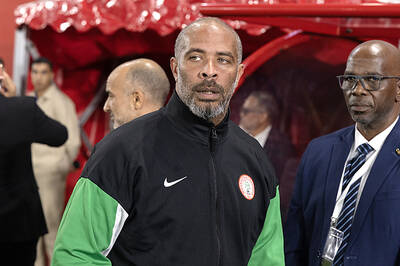
Nigeria’s soccer coach has accused the Democratic Republic of the Congo (DR Congo) of practicing “voodoo” after his squad’s hopes of qualifying for next year’s FIFA World Cup ended in a penalty shoot-out loss in the African playoff final. DR Congo and Nigeria drew 1-1 after extra-time in the tie in Rabat, Morocco, on Sunday and the central Africans won 4-3 on penalties to book a place in inter-confederation playoffs in Mexico in March next year. In his post-match remarks to journalists, coach Eric Chelle said a member of the DR Congo team “did some voodoo, every time, every time, every time.” “That
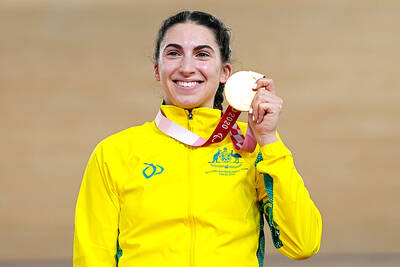
Australian cyclist Paige Greco, a Paralympic gold medalist, has died. She was 28. A joint statement by the Australian Paralympic Committee and Cycling Australia said that Greco “passed away in her Adelaide home after experiencing a sudden medical episode” on Sunday. “Paige meant everything to us,” her mother Natalie Greco said. “Her kindness, her determination and her warmth touched our family every single day. She brought so much joy and pride into our lives, and the pain of her passing is something we will carry forever, “ Natalie Greco said. “While we are devastated by her loss, we are incredibly proud of the person she